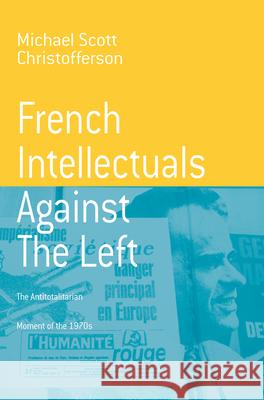French Intellectuals Against the Left: The Antitotalitarian Moment of the 1970s » książka
French Intellectuals Against the Left: The Antitotalitarian Moment of the 1970s
ISBN-13: 9781571814272 / Angielski / Miękka / 2004 / 306 str.
French Intellectuals Against the Left: The Antitotalitarian Moment of the 1970s
ISBN-13: 9781571814272 / Angielski / Miękka / 2004 / 306 str.
(netto: 129,58 VAT: 5%)
Najniższa cena z 30 dni: 134,94
ok. 30 dni roboczych
Bez gwarancji dostawy przed świętami
Darmowa dostawa!
" . . . an exceptionally fine text - one that could only have been written by an author mercifully free, for whatever reason of the phobias and philias about French intellectual life of previous generations." - New Left Review "This book is clearly an indispensable resource for historians of twentieth-century France and French intellectual life, and a fine resource for anyone interested in a political sociology of the intellectual. Its fundamental thesis concerning the political sources of the antitotalitarian moment in the discourse of direct democracy and the electoral opposition to the PCF is largely persuasive-and a welcome antidote to the many distortions that obscure this key reactive shift." - Radical Philosophy "I learned an enormous amount from your first-rate contribution. It is a very exciting and intelligent piece of work . . . very impressive." - Michael Seidman In the latter half of the 1970s, the French intellectual Left denounced communism, Marxism, and revolutionary politics through a critique of left-wing totalitarianism that paved the way for today's postmodern, liberal, and moderate republican political options. Contrary to the dominant understanding of the critique of totalitarianism as an abrupt rupture induced by Aleksandr Solzhenitsyn's The Gulag Archipelago, Christofferson argues that French anti-totalitarianism was the culmination of direct-democratic critiques of communism and revisions of the revolutionary project after 1956. The author's focus on the direct-democratic politics of French intellectuals offers an important alternative to recent histories that seek to explain the course of French intellectual politics by France's apparent lack of a liberal tradition. Michael Scott Christofferson was educated at Carleton College and Columbia University. He currently is Assistant Professor of History at the Pennsylvania State University, Erie and lives in the Cleveland, Ohio.
" . . . an exceptionally fine text - one that could only have been written by an author mercifully free, for whatever reason of the phobias and philias about French intellectual life of previous generations." - New Left Review"This book is clearly an indispensable resource for historians of twentieth-century France and French intellectual life, and a fine resource for anyone interested in a political sociology of the intellectual. Its fundamental thesis concerning the political sources of the antitotalitarian moment in the discourse of direct democracy and the electoral opposition to the PCF is largely persuasive-and a welcome antidote to the many distortions that obscure this key reactive shift." - Radical Philosophy"I learned an enormous amount from your first-rate contribution. It is a very exciting and intelligent piece of work . . . very impressive." - Michael SeidmanIn the latter half of the 1970s, the French intellectual Left denounced communism, Marxism, and revolutionary politics through a critique of left-wing totalitarianism that paved the way for todays postmodern, liberal, and moderate republican political options. Contrary to the dominant understanding of the critique of totalitarianism as an abrupt rupture induced by Aleksandr Solzhenitsyns The Gulag Archipelago, Christofferson argues that French anti-totalitarianism was the culmination of direct-democratic critiques of communism and revisions of the revolutionary project after 1956. The authors focus on the direct-democratic politics of French intellectuals offers an important alternative to recent histories that seek to explain the course of French intellectual politics by Frances apparent lack of a liberal tradition.Michael Scott Christofferson was educated at Carleton College and Columbia University. He currently is Assistant Professor of History at the Pennsylvania State University, Erie and lives in the Cleveland, Ohio.











